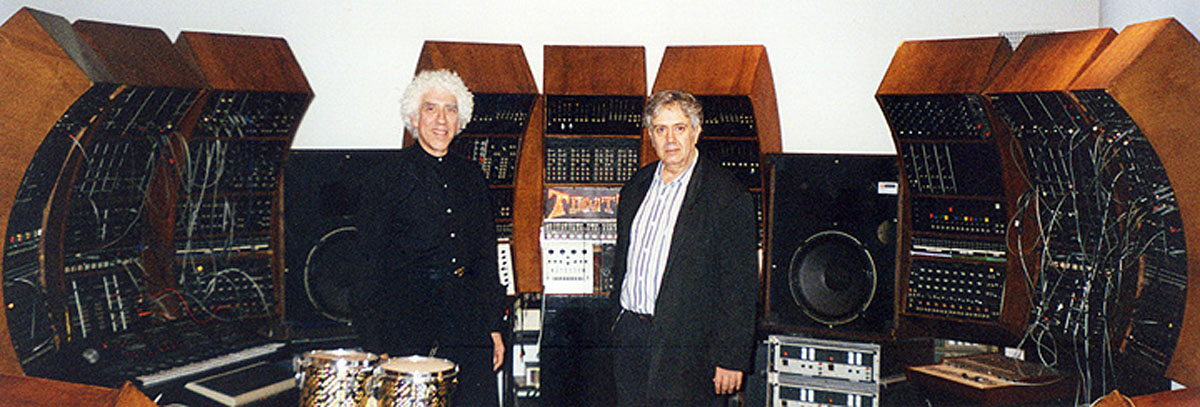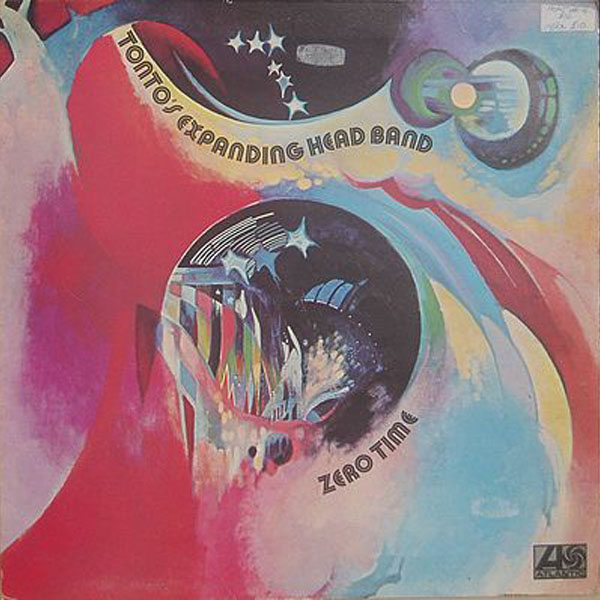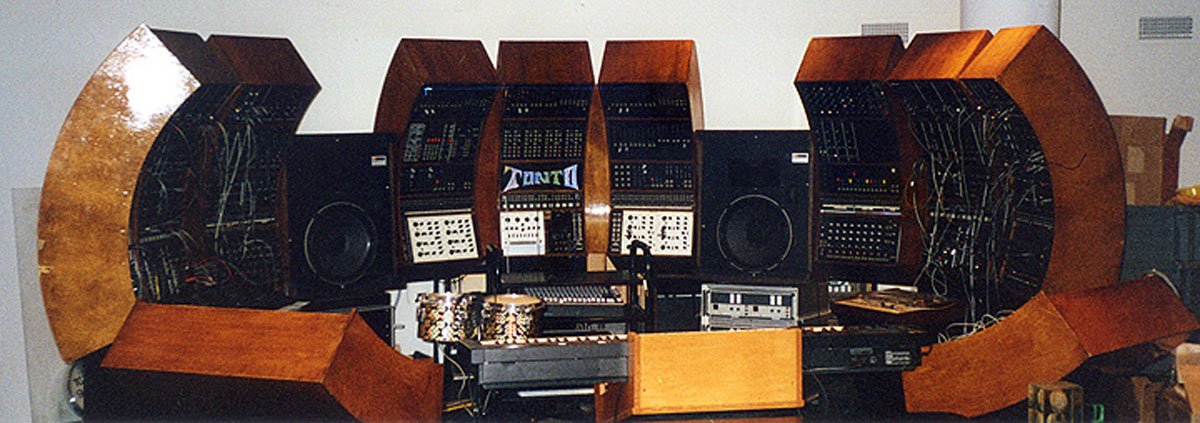Malcolm Cecil of Synth Pioneers Tonto's Expanding Head Band Leaves the Planet.
by John Diliberto 3/30/2021

TONTO with Malcolm Cecil and Robert Margouleff at Mutato Muzika 1996. Photo: J. Diliberto
It has been 50 years since Tonto’s Expanding Head Band first took flight on the 1971 album, Zero Time. And now, one of the pilots of this electronic spacecraft has tweaked his last oscillator. Malcolm Cecil is gone at 84, passing on March 28, 2021, after a reportedly long illness.
Zero Time, recorded on their electronic array called TONTO, predated by years the sequencer-driven recordings of Tangerine Dream‘s Phaedra, Klaus Schulze‘s Picture Music and Kraftwerk‘s Autobahn. It was an album of thudding bass grooves, melodic electronic flights and deep ambient expanses, long before that became part of the electronic music vernacular.
 You may have never heard Zero Time, but its influence reverberated throughout space music and popular music. Look at the credits on ‘70s albums by Quincy Jones, The Isley Brothers, Minnie Ripperton and many others and you’ll see the names of Malcolm Cecil and Robert Margouleff, the creators of TONTO. But their most important connection remains Stevie Wonder. Wonder’s brilliant mid-70s quartet that began with Music of My Mind were all mid-wifed by Malcolm Cecil and Robert Margouleff along with the TONTO synthesizer.
You may have never heard Zero Time, but its influence reverberated throughout space music and popular music. Look at the credits on ‘70s albums by Quincy Jones, The Isley Brothers, Minnie Ripperton and many others and you’ll see the names of Malcolm Cecil and Robert Margouleff, the creators of TONTO. But their most important connection remains Stevie Wonder. Wonder’s brilliant mid-70s quartet that began with Music of My Mind were all mid-wifed by Malcolm Cecil and Robert Margouleff along with the TONTO synthesizer.
I got to interview Malcom Cecil a couple of times. Once was in the early 1980s in my Philadelphia apartment for the radio series Totally Wired. The second time was in 1996 with Robert Margouleff. That one took place in the Mutato Muzika studios of Devo’s Mark Mothersbaugh in Los Angeles. Cecil was always effusive and full of stories and anecdotes. He had a wide smile under his head of curly white hair, and almost cartoonish eyebrows that always made me think of the Scarecrow in The Wizard of Oz.
I remember the then 60-year old Malcolm Cecil negotiating a spaghetti of wires, cables and keyboards, hunched under the imposing presence of TONTO, an acronym for The Original New Timbral Orchestra. It was an artfully constructed collection of Moog Modular synthesizers, ARPs, Oberheims and Serge devices, all beautifully encased in curved wood racks that were much more attractive than the walls of new modular synths you see today. It was so impressive that Brian De Palma used it on-screen in his 1974 movie, Phantom of the Paradise. This imposing behemoth of knobs, buttons and blinking lights produced the sounds of the influential album, Zero Time.
Born on January 9, 1937 in England, Malcom Cecil was a classically trained bass player, turned jazz musician, turned studio engineer. He played in several key British jazz ensembles including the Jazz Couriers, Ronnie Scott‘s ensemble, and the original edition of Alexis Korner’s Blues Incorporated. He came to America in the late 60s as a recording engineer. There, he met Robert Margouleff, a lapsed operatic tenor turned film producer. When he needed music for his self-produced movie, Ciao Manhattan, he bought a Moog synthesizer and became the house synthesist at Media Sound Studios in New York, where Cecil was the house engineer. They began working together and slowly began acquiring electronic modules. The Moog synthesizer was still a novelty in 1971, and Margouleff and Cecil, coming from straight music backgrounds, weren’t sure their first piece, “Aurora,” was even music.
“Originally ‘Aurora’ was 27 minutes long and it’s one of the pieces that Bob was working on when we met,” recalled Cecil.
“I said to him, Malcolm, I’m not even sure if this is music,” said Margouleff.
It was music. It just happened to be a new form of music, a long, mournful track of deep swirling electronic textures, earth scraping bass and a melody that seemed like a lament for the end of the world.
“It turned out to be a really, I suppose a very sort of primal piece,” admitted Cecil. “It’s sort of ageless.”

TONTO at Mutato Muzika 1996. Photo: J. Diliberto
After getting a label deal, the duo began composing the music for Zero Time. By now, their synthesizer had a name: The Original New Timbral Orchestra, or TONTO. And that spawned the name of the group, Tonto’s Expanding Head Band.
“The play on words was the right out of the silver 60s,” conceded Cecil.. “We were totally into the psychedelic culture.”
Many of the elements we take for granted with synthesizers today took painstaking and circuitous paths to accomplish with TONTO. Both Margouleff and Cecil would play the instrument simultaneously, one performing the melody, while another shaped the notes. Firing up TONTO, Cecil got Echoes producer Jeff Towne to play a bongo that is electronically linked to the synthesizer, while Cecil played the keyboard.
“Very Tontoish I should say,” laughed Cecil.
Before Vocoders and electronic sound modeling, Cecil and Margouleff created electronic voices on the track “Riversong.”
“It was our attempt at voice synthesis,” explained Cecil. “Bob is trained as a tenor. He’s an operatic tenor. So he has all the understanding of the vocal melodic lines. I was playing on the keyboard and Bob was creating the words and we worked together to create the sound that ended up being the vocal which is somewhat unintelligible. We had terrible difficulty making consonants and Ks and the one thing that still irks me to this day that I’ve always wanted to fix was the line in there which is the whole major line of the whole thing. It says, ‘I’m the river, but I’m not the current.’ And it comes out, ‘I am the errant.’”
He laughed at that because Malcom Cecil laughed a lot. But Zero Time was no laughing matter. 50 years later, it still sounds timeless with those deep Moog basslines and a timbral richness that has not dated. Songs like “Cybernaut” are warp-5 synthesizer drives into space and “Timewhys” uses cyclical melodic patterns that spin your mind, especially on headphones.
TONTO would probably be a tiny footnote in modern music if one day, Stevie Wonder hadn’t walked into the studio after a bass player named Ronnie Blanco played Zero Time for him.
“Ronnie played the album to Stevie and he told Stevie that this was a keyboard instrument that he needed to check out.” said Cecil. “Anyway, there was a ring at the bell and it turns out to be Ronnie Blanco. He says, come down, ‘Here I’ve got somebody who wants to check out TONTO.’ So we went into the studio and who walks in on Ronnie Blanco’s arm with our album on the other arm is Stevie. And he came into the studio. And that first weekend we put down 17 songs.”
Robert Margouleff and Malcolm Cecil would produce and play on the four quintessential Stevie Wonder albums, Music of My Mind, Talking Book, Innervisions and Fulfillingness’ First Finale. They went on to produce hit albums for The Isley Brothers and Minnie Ripperton. On his own, Margouleff went on to produce Devo‘s Freedom of Choice and Shadowfax‘s The Odd Get Even. Cecil produced Steve Hillage and had a longtime producing relationship with Gil Scott Heron.
Tonto’s Expanding Head Band would record only one more album, It’s About Time. It was never released in America until most of it appeared on the collection TONTO Rides Again, which contained all of Zero Time and all of It’s About Time, albeit with the tracks all retitled. Cecil would release some solo albums, including the New Age inclined Radiance and A Jazzy Christmas. They tried a few times to fire up TONTO again, but nothing much came of it. The recently refurbished TONTO now resides in Calgary, Alberta at the National Music Centre. But Cecil was playing live electronic shows close to the end, performing concerts at the Ambient Church in Los Angeles and New York City, but not with TONTO.
“It’s an instrument, okay?” insisted Margouleff. “And it’s a one of kind instrument. There’s no other instrument like it. It has its own process and its own thing and after all, there’s a few things you can say about instrument that was designed on a tablecloth, you know? It has its own kind of magic.”
So did Malcolm Cecil 1937-2021.
